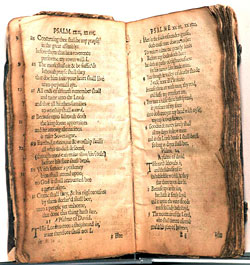
Psalm II written in the "Bay Psalm Book", the earliest book printed in America, is the same psalm as the one in "The Book of Psalms" but there are many differences between the two. Psalm II in the "Bay Psalm Book" was translated by two early Americans, Richard Mather and John Eliot (wikipedia.com), and therefore portrays how early Americans felt about the Psalms and their life/current situations at the time.
The most noticeable change in this psalm is the language/writing style which is in old English. Also, the phrasing is different which has a substantial effect on the feel of the poem. I think that this version of Psalm II is more conducive to group participation which was probably very popular with early Americans in their newly established communities. The psalm feels more poem-like than the version of psalm II in "The Book of Psalms" would maybe make it easier to recite together.
Also, in this version Psalm II, there is a warning, but it seems more of a warning to the Kings and Princes (that the early Americans have just left or escaped from in their different European homeland countries). The Psalm is warning the monarchs to watch out for what the Lord will do to them and also what these early Americans will do back to the kings. " Let us asuner break their bands, their cords bee from us throwne" is in this version and not in quotes in the text, meaning it is being said by the Americans, whereas in " The Book of Psalms" version, the Kings and Princes say " Let us tear off their fetters, let us fling away their bonds!" In that version, that statement is in quotes meaning the monarchs said it ( but this is also just an interpretation of Robert Alter, the translator). I do think this all holds some significance because the early Americans did not include quotes for a reason- they wanted to be the ones to state those words again the kings that use to control them.
Another warning to the kings is later on in the Psalm: " And now yee Kings bewise, be learn'd yee Judges of th'earth/ Serve yee lord with reverence, rejoyce in him with feare." I feel that overall this version is more of a warning of the Lord's power to the Kings that the early Americans just left but are still being controlled by (early European colonies) rather than the people.


No comments:
Post a Comment